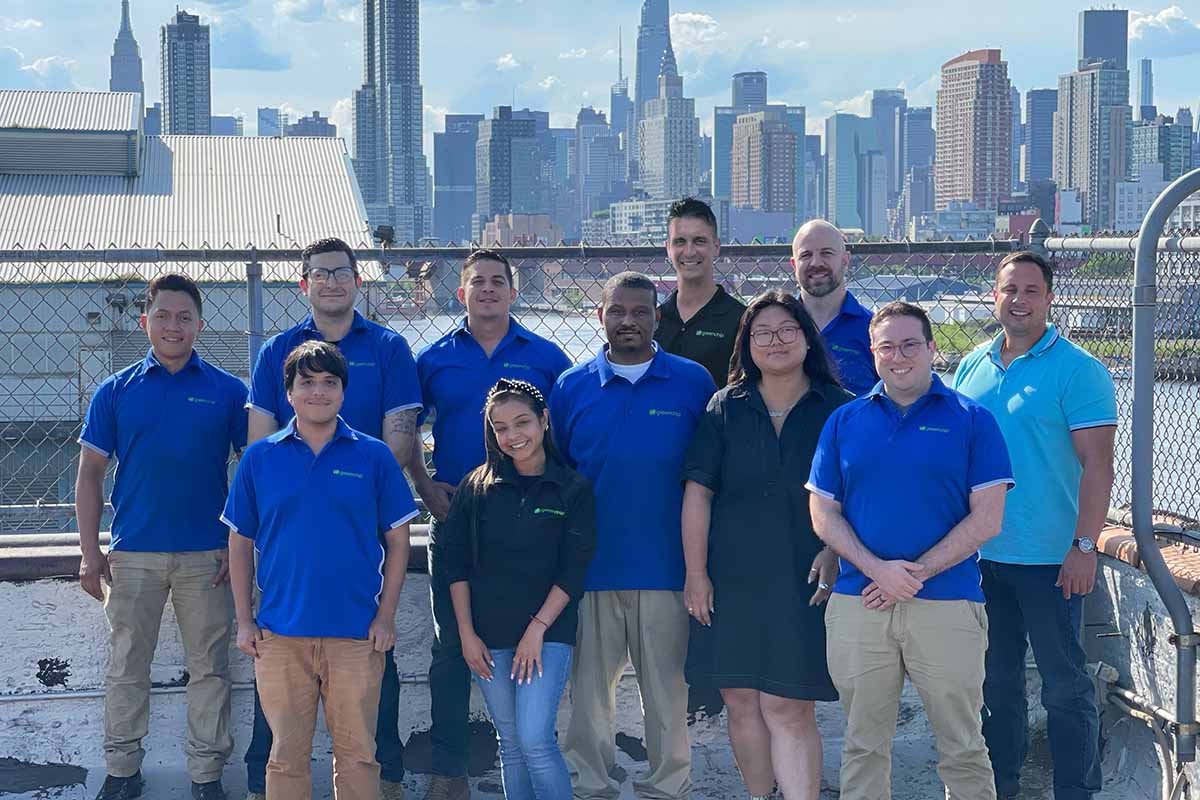
The staff of GreenChip’s Brooklyn, N.Y. operation, with Managing Partner Bill Monteleone on the far right. | Courtesy of GreenChip
Responding to client needs as well as market shifts around plastics and other materials, e-scrap and ITAD company GreenChip has plans to significantly expand in Virginia.
GreenChip has operated out of a 35,000-square-foot facility in Brooklyn, N.Y. for a decade, and in 2020, the company opened a 65,000-square-foot site with shredding capabilities in Fredericksburg, Va.
Last month, the company finalized the purchase of roughly 20 acres of property at the King George Industrial Park – located just outside of Fredericksburg, which is around 50 miles from Washington, D.C. – where it plans to develop an “eco-campus” for a deeper sort of commodities recovered from electronics.
“A large part of the future of the industry is employing the latest technologies as far as metals and plastics go to give us that clean output of material,” Bill Monteleone, GreenChip’s managing partner, said in an interview.
He added that over the last five years, the company has seen significant alterations in the global flow of scrap commodities, with logistics issues making it harder to send materials overseas and corporate entities in North America increasing their desire for circular supply chains.
“We think we can help customers meet their goals and be a part of the future of creating feedstock and commodity streams domestically,” Monteleone noted.
Trend toward more domestic processing
The company’s eco-campus vision involves building out space in the coming years to add additional layers of sortation, with the goal of creating homogenous loads of commodities ready for remanufacturing.
A press release from the King George Economic Development Authority, which manages the property that will be home to the eco-campus, notes GreenChip purchased lots 7, 8 and 10 in the industrial park. Additional materials from the authority indicate those three lots total 20.8 acres and were listed at a total price of just over $716,000.
GreenChip is now in the design-and-plan phase for building out the property, which includes a rail spur. Monteleone said it’s too early to determine an overall investment figure for the project.
The eco-campus initiative follows moves from other industry stakeholders to engage in more extensive processing of e-scrap materials within North America.
Last October, Igneo unveiled plans for a large smelter in Georgia to target lower-grade e-scrap materials, and the company has since rolled out an e-scrap processing arm called evTerra. Meanwhile, global metals companies Aurubis and Wieland have announced plans to expand their U.S. presence.
For GreenChip, the move to sort deeper and work to keep material in domestic markets is the latest development in a period of company growth.
In opening its Virginia processing site in 2020, the company essentially tripled its processing footprint and set itself up to meet the needs of OEMs and corporate clients all the way down the East Coast (the company also operates a sales office in Florida).
Learn more in person
Chris Kaasman of GreenChip will be a speaker on a 2022 E-Scrap Conference session exploring how different processors are growing in response to market conditions. The conference takes place Sept. 19-21 in New Orleans. Sign up today!
The Virginia site runs a shredder with a footprint of around 20,000 square feet, and the facility is certified to both e-Stewards and R2. The company’s New York facility is certified to R2 and is in the process of becoming certified to e-Stewards.
The company also recently added Chris Kaasman, formerly of Samsung, as its vice president of compliance.
“I have nothing but good things to say about my time in Samsung,” Kaasman said. “I’ve been in recycling for 12 or 13 years, but I’ve never gotten my hands dirty with what is happening at the ground level. Bill’s passion and the things they are doing was attractive to me.”
GreenChip currently employs around 50 people across its two facilities.
Monteleone said the business benefited from spending its first 10 years solely focused on the New York site, noting the staff was able to dial in processes and learn to provide strong customer service to clients.
“We’ve always looked up to the big recyclers – the ERIs and the URTs,” he said. “We’ve always admired how they put a lot of time into technology and their people. We feel they set the tone, and we see ourselves doing the same things now.”



